Interviews
 [Petr Dorùžka, Krems, Austria] Music enterpreneur Ankur Malhotra explains: The reason is favoritism and classism. There are millions spent by billionaires on weddings rather than be used to support the musicians via grant systems. Malhotra represents some of the best Indian folk and roots musicians who perform on major festivals worldwide. Barmer Boys play spiritual Hindi and Muslim songs from the Rajasthani desert. 77-year-old Lakha Khan is the last living sarangi violin master. His music ranges from ragas to Sufi chants and epic chants.
[Petr Dorùžka, Krems, Austria] Music enterpreneur Ankur Malhotra explains: The reason is favoritism and classism. There are millions spent by billionaires on weddings rather than be used to support the musicians via grant systems. Malhotra represents some of the best Indian folk and roots musicians who perform on major festivals worldwide. Barmer Boys play spiritual Hindi and Muslim songs from the Rajasthani desert. 77-year-old Lakha Khan is the last living sarangi violin master. His music ranges from ragas to Sufi chants and epic chants.
28. 9. 2024 |
read more...
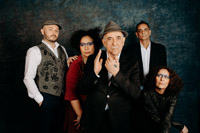 [Petr Dorůžka, Praha] After 42 years and 14 albums, Lo’Jo still sound like a group of visionaries from another world. Their roots go back to the punk rock era, but you can’t hear it in their music. Also, Lo’Jo is untouched by French musical stereotypes. If you hear a chanson track, it’s shifted into a distorted Tom Waits perspective.
[Petr Dorůžka, Praha] After 42 years and 14 albums, Lo’Jo still sound like a group of visionaries from another world. Their roots go back to the punk rock era, but you can’t hear it in their music. Also, Lo’Jo is untouched by French musical stereotypes. If you hear a chanson track, it’s shifted into a distorted Tom Waits perspective.
1. 9. 2024 |
read more...
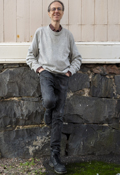 [Petr Dorůžka, Praha] In Finland, tradition is practiced as a living process and not as a museum exhibit, due to many dozens of creative musicians and educators. One of the first entrepreneurs to bring Finnish music to the world stage was Phillip Page. Already charmed by Finnish LPs as a DJ and record shop manager in the US, he moved from Texas to Helsinki in 1987. Since that time, he worked with artists such as JPP, Maria Kalaniemi, Värttinä, Kimmo Pohjonen and others, introducing them to audiences around the world.
[Petr Dorůžka, Praha] In Finland, tradition is practiced as a living process and not as a museum exhibit, due to many dozens of creative musicians and educators. One of the first entrepreneurs to bring Finnish music to the world stage was Phillip Page. Already charmed by Finnish LPs as a DJ and record shop manager in the US, he moved from Texas to Helsinki in 1987. Since that time, he worked with artists such as JPP, Maria Kalaniemi, Värttinä, Kimmo Pohjonen and others, introducing them to audiences around the world.
26. 6. 2024 |
read more...
 [Petr Dorůžka, Praha] How would collectors like Béla Bartók or Leoš Janáček work if they lived today? Endangered traditions that they managed to capture have definitely disappeared in some regions, but they still live elsewhere. Hiram Salsano was born in Agropoli, a seaside resort 120 km south of Naples. Since 2005, she has been visiting rural farms in the interior and recording the songs of the oldest living witnesses.
[Petr Dorůžka, Praha] How would collectors like Béla Bartók or Leoš Janáček work if they lived today? Endangered traditions that they managed to capture have definitely disappeared in some regions, but they still live elsewhere. Hiram Salsano was born in Agropoli, a seaside resort 120 km south of Naples. Since 2005, she has been visiting rural farms in the interior and recording the songs of the oldest living witnesses.
15. 2. 2024 |
read more...
 [Petr Dorůžka, Praha] The ud, one of the most common instruments in the Middle East, is considered to be the forerunner of a whole host of stringed instruments, including the European guitar. Unlike the guitar, it does not have frets and therefore is not limited by European scales. Besides Arab countries, a number of excellent players live in Turkey, Israel or Armenia and, thanks to the migration in recent decades, also in Europe. The instrument has gained respect in jazz thanks to musicians as Anouar Brahem from Tunisia, who records for ECM, or Rabih Abou-Khalil from Lebanon.
[Petr Dorůžka, Praha] The ud, one of the most common instruments in the Middle East, is considered to be the forerunner of a whole host of stringed instruments, including the European guitar. Unlike the guitar, it does not have frets and therefore is not limited by European scales. Besides Arab countries, a number of excellent players live in Turkey, Israel or Armenia and, thanks to the migration in recent decades, also in Europe. The instrument has gained respect in jazz thanks to musicians as Anouar Brahem from Tunisia, who records for ECM, or Rabih Abou-Khalil from Lebanon.
1. 2. 2024 |
read more...
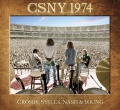 [by Ken Hunt, London] David Crosby is a musician whose influence is paramount to the way my musical tastes developed. Directly or indirectly. This interview snippet is drawn from a far longer one conducted in September 2012 for an article in R2 that appeared at the time of the release of the 2012 DVD set. Here we discuss, among other subjects, a range of possibilities to do with writing songs and the influence of the Nubian oud player Hamza El Din.
[by Ken Hunt, London] David Crosby is a musician whose influence is paramount to the way my musical tastes developed. Directly or indirectly. This interview snippet is drawn from a far longer one conducted in September 2012 for an article in R2 that appeared at the time of the release of the 2012 DVD set. Here we discuss, among other subjects, a range of possibilities to do with writing songs and the influence of the Nubian oud player Hamza El Din.
25. 1. 2018 |
read more...
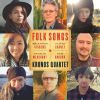 by Ken Hunt, London] This interview with David Harrington of the Kronos Quartet took place on 11 July 2014 – long before Folk Songs (released by Nonesuch Records in June 2017) was even conceived. It is published for the historian-minded. This sliver ends with talking about Ukrainian composer-musician Mariana Sadovska.
by Ken Hunt, London] This interview with David Harrington of the Kronos Quartet took place on 11 July 2014 – long before Folk Songs (released by Nonesuch Records in June 2017) was even conceived. It is published for the historian-minded. This sliver ends with talking about Ukrainian composer-musician Mariana Sadovska.
19. 6. 2017 |
read more...
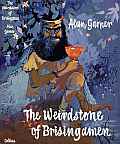 [by Ken Hunt, London] 2010 marks the 50th anniversary of the publication of Alan Garner’s novel, The Weirdstone of Brisingamen and HarperCollins has duly published a 50th anniversary edition. Hence the excuse to re-publish part of the first part of this interview. Any changes are so that the text conforms to our style guide and to contextualise and clarify matters. There has been no attempt to impose updates on this interview.
[by Ken Hunt, London] 2010 marks the 50th anniversary of the publication of Alan Garner’s novel, The Weirdstone of Brisingamen and HarperCollins has duly published a 50th anniversary edition. Hence the excuse to re-publish part of the first part of this interview. Any changes are so that the text conforms to our style guide and to contextualise and clarify matters. There has been no attempt to impose updates on this interview.
18. 10. 2010 |
read more...
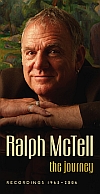 [by Ken Hunt, London] Ralph McTell is one of Britain’s foremost commentators on the national condition using demotic idioms – folk, blues, ragtime. Rather like Wolf Biermann, Franz-Josef Degenhardt and Christof Stählin in Germany (and then add your own regional or national candidates), he has depicted his homeland through music, through songs, that meanings of which seem immediately apparent but which may well prove to be more eely or oblique.
[by Ken Hunt, London] Ralph McTell is one of Britain’s foremost commentators on the national condition using demotic idioms – folk, blues, ragtime. Rather like Wolf Biermann, Franz-Josef Degenhardt and Christof Stählin in Germany (and then add your own regional or national candidates), he has depicted his homeland through music, through songs, that meanings of which seem immediately apparent but which may well prove to be more eely or oblique.
2. 4. 2010 |
read more...
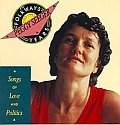 [by Ken Hunt, London] Peggy Seeger was one of people like Ramblin’ Jack Elliott and Big Bill Broonzy and Cisco Houston whose records introduced Britain to an authentic lexicon of Americana. That word didn’t exist in the 1950s but if it had those musicians would have pretty much defined it.
[by Ken Hunt, London] Peggy Seeger was one of people like Ramblin’ Jack Elliott and Big Bill Broonzy and Cisco Houston whose records introduced Britain to an authentic lexicon of Americana. That word didn’t exist in the 1950s but if it had those musicians would have pretty much defined it.
1. 2. 2010 |
read more...
Older articles »
 [Petr Dorùžka, Krems, Austria] Music enterpreneur Ankur Malhotra explains: The reason is favoritism and classism. There are millions spent by billionaires on weddings rather than be used to support the musicians via grant systems. Malhotra represents some of the best Indian folk and roots musicians who perform on major festivals worldwide. Barmer Boys play spiritual Hindi and Muslim songs from the Rajasthani desert. 77-year-old Lakha Khan is the last living sarangi violin master. His music ranges from ragas to Sufi chants and epic chants.
[Petr Dorùžka, Krems, Austria] Music enterpreneur Ankur Malhotra explains: The reason is favoritism and classism. There are millions spent by billionaires on weddings rather than be used to support the musicians via grant systems. Malhotra represents some of the best Indian folk and roots musicians who perform on major festivals worldwide. Barmer Boys play spiritual Hindi and Muslim songs from the Rajasthani desert. 77-year-old Lakha Khan is the last living sarangi violin master. His music ranges from ragas to Sufi chants and epic chants. [Petr Dorůžka, Praha] After 42 years and 14 albums, Lo’Jo still sound like a group of visionaries from another world. Their roots go back to the punk rock era, but you can’t hear it in their music. Also, Lo’Jo is untouched by French musical stereotypes. If you hear a chanson track, it’s shifted into a distorted Tom Waits perspective.
[Petr Dorůžka, Praha] After 42 years and 14 albums, Lo’Jo still sound like a group of visionaries from another world. Their roots go back to the punk rock era, but you can’t hear it in their music. Also, Lo’Jo is untouched by French musical stereotypes. If you hear a chanson track, it’s shifted into a distorted Tom Waits perspective.  [Petr Dorůžka, Praha] In Finland, tradition is practiced as a living process and not as a museum exhibit, due to many dozens of creative musicians and educators. One of the first entrepreneurs to bring Finnish music to the world stage was Phillip Page. Already charmed by Finnish LPs as a DJ and record shop manager in the US, he moved from Texas to Helsinki in 1987. Since that time, he worked with artists such as JPP, Maria Kalaniemi, Värttinä, Kimmo Pohjonen and others, introducing them to audiences around the world.
[Petr Dorůžka, Praha] In Finland, tradition is practiced as a living process and not as a museum exhibit, due to many dozens of creative musicians and educators. One of the first entrepreneurs to bring Finnish music to the world stage was Phillip Page. Already charmed by Finnish LPs as a DJ and record shop manager in the US, he moved from Texas to Helsinki in 1987. Since that time, he worked with artists such as JPP, Maria Kalaniemi, Värttinä, Kimmo Pohjonen and others, introducing them to audiences around the world.  [Petr Dorůžka, Praha] How would collectors like Béla Bartók or Leoš Janáček work if they lived today? Endangered traditions that they managed to capture have definitely disappeared in some regions, but they still live elsewhere. Hiram Salsano was born in Agropoli, a seaside resort 120 km south of Naples. Since 2005, she has been visiting rural farms in the interior and recording the songs of the oldest living witnesses.
[Petr Dorůžka, Praha] How would collectors like Béla Bartók or Leoš Janáček work if they lived today? Endangered traditions that they managed to capture have definitely disappeared in some regions, but they still live elsewhere. Hiram Salsano was born in Agropoli, a seaside resort 120 km south of Naples. Since 2005, she has been visiting rural farms in the interior and recording the songs of the oldest living witnesses. [Petr Dorůžka, Praha] The ud, one of the most common instruments in the Middle East, is considered to be the forerunner of a whole host of stringed instruments, including the European guitar. Unlike the guitar, it does not have frets and therefore is not limited by European scales. Besides Arab countries, a number of excellent players live in Turkey, Israel or Armenia and, thanks to the migration in recent decades, also in Europe. The instrument has gained respect in jazz thanks to musicians as Anouar Brahem from Tunisia, who records for ECM, or Rabih Abou-Khalil from Lebanon.
[Petr Dorůžka, Praha] The ud, one of the most common instruments in the Middle East, is considered to be the forerunner of a whole host of stringed instruments, including the European guitar. Unlike the guitar, it does not have frets and therefore is not limited by European scales. Besides Arab countries, a number of excellent players live in Turkey, Israel or Armenia and, thanks to the migration in recent decades, also in Europe. The instrument has gained respect in jazz thanks to musicians as Anouar Brahem from Tunisia, who records for ECM, or Rabih Abou-Khalil from Lebanon. [by Ken Hunt, London] David Crosby is a musician whose influence is paramount to the way my musical tastes developed. Directly or indirectly. This interview snippet is drawn from a far longer one conducted in September 2012 for an article in R2 that appeared at the time of the release of the 2012 DVD set. Here we discuss, among other subjects, a range of possibilities to do with writing songs and the influence of the Nubian oud player Hamza El Din.
[by Ken Hunt, London] David Crosby is a musician whose influence is paramount to the way my musical tastes developed. Directly or indirectly. This interview snippet is drawn from a far longer one conducted in September 2012 for an article in R2 that appeared at the time of the release of the 2012 DVD set. Here we discuss, among other subjects, a range of possibilities to do with writing songs and the influence of the Nubian oud player Hamza El Din.  by Ken Hunt, London] This interview with David Harrington of the Kronos Quartet took place on 11 July 2014 – long before Folk Songs (released by Nonesuch Records in June 2017) was even conceived. It is published for the historian-minded. This sliver ends with talking about Ukrainian composer-musician Mariana Sadovska.
by Ken Hunt, London] This interview with David Harrington of the Kronos Quartet took place on 11 July 2014 – long before Folk Songs (released by Nonesuch Records in June 2017) was even conceived. It is published for the historian-minded. This sliver ends with talking about Ukrainian composer-musician Mariana Sadovska. [by Ken Hunt, London] 2010 marks the 50th anniversary of the publication of Alan Garner’s novel, The Weirdstone of Brisingamen and HarperCollins has duly published a 50th anniversary edition. Hence the excuse to re-publish part of the first part of this interview. Any changes are so that the text conforms to our style guide and to contextualise and clarify matters. There has been no attempt to impose updates on this interview.
[by Ken Hunt, London] 2010 marks the 50th anniversary of the publication of Alan Garner’s novel, The Weirdstone of Brisingamen and HarperCollins has duly published a 50th anniversary edition. Hence the excuse to re-publish part of the first part of this interview. Any changes are so that the text conforms to our style guide and to contextualise and clarify matters. There has been no attempt to impose updates on this interview. [by Ken Hunt, London] Ralph McTell is one of Britain’s foremost commentators on the national condition using demotic idioms – folk, blues, ragtime. Rather like Wolf Biermann, Franz-Josef Degenhardt and Christof Stählin in Germany (and then add your own regional or national candidates), he has depicted his homeland through music, through songs, that meanings of which seem immediately apparent but which may well prove to be more eely or oblique.
[by Ken Hunt, London] Ralph McTell is one of Britain’s foremost commentators on the national condition using demotic idioms – folk, blues, ragtime. Rather like Wolf Biermann, Franz-Josef Degenhardt and Christof Stählin in Germany (and then add your own regional or national candidates), he has depicted his homeland through music, through songs, that meanings of which seem immediately apparent but which may well prove to be more eely or oblique. [by Ken Hunt, London] Peggy Seeger was one of people like Ramblin’ Jack Elliott and Big Bill Broonzy and Cisco Houston whose records introduced Britain to an authentic lexicon of Americana. That word didn’t exist in the 1950s but if it had those musicians would have pretty much defined it.
[by Ken Hunt, London] Peggy Seeger was one of people like Ramblin’ Jack Elliott and Big Bill Broonzy and Cisco Houston whose records introduced Britain to an authentic lexicon of Americana. That word didn’t exist in the 1950s but if it had those musicians would have pretty much defined it.